
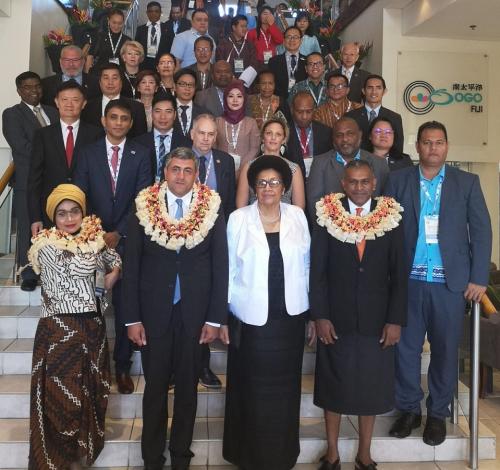
UNWTO: A conversation on climate change
Madrid, Spain, 20 June 2018 – The Secretary-General of the World Tourism Organization (UNWTO), Zurab Pololikashvili, called for the tourism sector to take more action to combat climate change and biodiversity loss during the 30th joint meeting of its Commissions for South Asia and Asia-Pacific in Fiji (18-20 June 2018).
Adding his voice to that of the host country, Mr. Pololikashvili advocated for stronger partnerships and incentives for governments, businesses and crucially tourists themselves to make a difference in climate action efforts. He also made clear that sound policies must be built upon accurate evidence, requiring the tourism sector to better measure its impact on sustainability – while acknowledging progress has been made in this regard, including UNWTO’s development of a statistical framework to measure sustainable tourism.
The remarks were made as part of a regional seminar on how tourism impacts upon sustainable development efforts in the region and globally, held as part of the meeting in the Fijian city of Nadi. The seminar featured deep dialogue on how tourism policies, partnerships and investments can tackle climate change and biodiversity loss.
This was the first Joint Commission meeting held in a Pacific island nation. The meeting and seminar highlighted the need for developing island countries to collaborate on actionable policies, with measurable results, to address climate change and biodiversity protection within the tourism sector. UNWTO also pledged to raise further awareness of climate change’s impacts and effects on tourism through capacity building and educational opportunities.
“This is the perfect place to have this conversation on climate change, as Fiji continues to lead the efforts on climate resilience and sustainability not only within the country but in the entire region. This was also demonstrated during the Global Climate Summit COP 23, when the Government of Fiji committed to the development of sustainable tourism as a tool to tackle climate change”, said Mr. Pololikashvili.
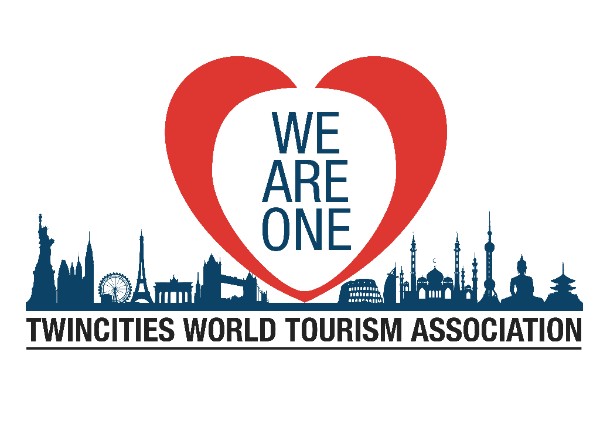
Twin Cities World Tourism Association to be founded at PATA Travel Mart 2018
BANGKOK, June 18, 2018 — The Pacific Asia Travel Association (PATA) is pleased to announce that the founding of the Twin Cities World Tourism Association (TCWTA) will take place during PATA Travel Mart 2018 (PTM 2018) in Langkawi, Malaysia from September 12-14.
PATA CEO Dr. Mario Hardy said, “PATA assists destinations around the world in the development of a responsible and sustainable tourism industry and it is only through cooperation and mutually beneficial partnerships that destinations can achieve such goals. The Twin Cities World Tourism Association’s mission is in line with our activities and PATA Travel Mart is the perfect occasion to launch this initiative.”
Twin cities, also known as sister cities, are collaborations between two cities to foster friendship and understanding between different cultures and to form strategic international business links between them.
The Twin Cities World Tourism Association aims to support and increase tourism and travel between twin cities, support and increase the exchange of ideas and concepts related to tourism and travel between sister cities, and enhance and strengthen relations between twin sisters through tourism and travel.
During PTM 2018, the founding president, Mr. Thomas Binder, Mayor of Gossau-Zurich in Switzerland, will formally announce the foundation of the Twin Cities World Tourism Association (TCWTA) at the Twin Cities World Tourism Forum taking place inside the exhibition hall.
Furthermore, a Board of 14 members will be appointed during this time. The Board will consist of 13 mayors from countries from all over the world while Mr. Hüseyin Baraner, being the only non-mayor member, will be appointed as its General Secretary. This Board will meet once a year in the city of the president to exchange ideas, concepts, and plans. A meeting of the Board will also be held in Zürich or Gossau at a later date in order to sign the charter of the Twin Cities World Tourism Association.
TCWTA also plans to publish a “Twin Cities Almanac” to be presented at ITB Berlin, which will include an editorial note of the president, reports on the tourism and travel activities of twin cities, and interviews with mayors of twin cities on topics like desiderata, plans, projects and the tourism development of twin cities.
The TCWTA President plans to visit a developing country in Africa or Asia once a year in order to research opportunities to take part in projects to further and support tourism and travel in twin cities located in regions without large financial funds.
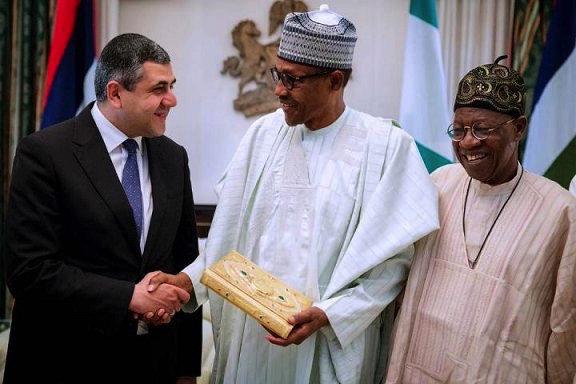
African Tourism Ministers Stress the Importance of Correct Tourism Measurement for Improved Policy
“Tourism Statistics: A Catalyst for Development”, was the theme of this year’s seminar in the context of the 61st Meeting of the UNWTO Commission for Africa (Abuja, Nigeria, 4-6 June). The meeting included a ministerial dialogue on the importance of tourism statistics under the topic “Better measure, better manage”.
The Commission for Africa attracted 18 tourism ministers from the region and key tourism stakeholders from 36 countries. Participants underscored how tourism projects can contribute to poverty alleviation, the importance of finding innovative approaches to developing tourism in the region, and the need to find and foster new partnerships and resources to develop the sector.
Against the backdrop of the growth of international tourism in Africa, tourism’s overall economic impact needs to be measured accurately in order for tourism strategies to effectively contribute to national economies. The ministerial dialogue addressed the significance of collecting and compiling quantitative and qualitative data, as well as the importance of commitments from national stakeholders and institutional partnerships for a rigorous tourism statistics system.
“The priorities of my mandate have been formed by listening to the needs of our member states and include the crucial targets of creating more and better tourism jobs, improving tourism education and fostering innovation”, said UNWTO Secretary-General, Zurab Pololikashvili. “We need to build tight links between public and private sectors for tourism to transform growth across the continent, and for the benefit of its people”, he added.
The meeting was attended by the President of Nigeria, Muhammadu Buhari, who stated that “Nigeria has great potentials for tourism and investment”, underscoring the relevance of the sector, both regarding its contribution to sustainable development and its role to further diversify the economy and increase social resilience.
In this context, the need for establishing a Statistical Framework for the Measurement of Sustainable Tourism (MST) was addressed. This Framework includes environmental, social and cultural tourism components geared towards achieving the 17 Sustainable Development Goals of the 2030 Agenda for Sustainable Development.
The next African Commission meeting will take place during the second quarter of 2019.
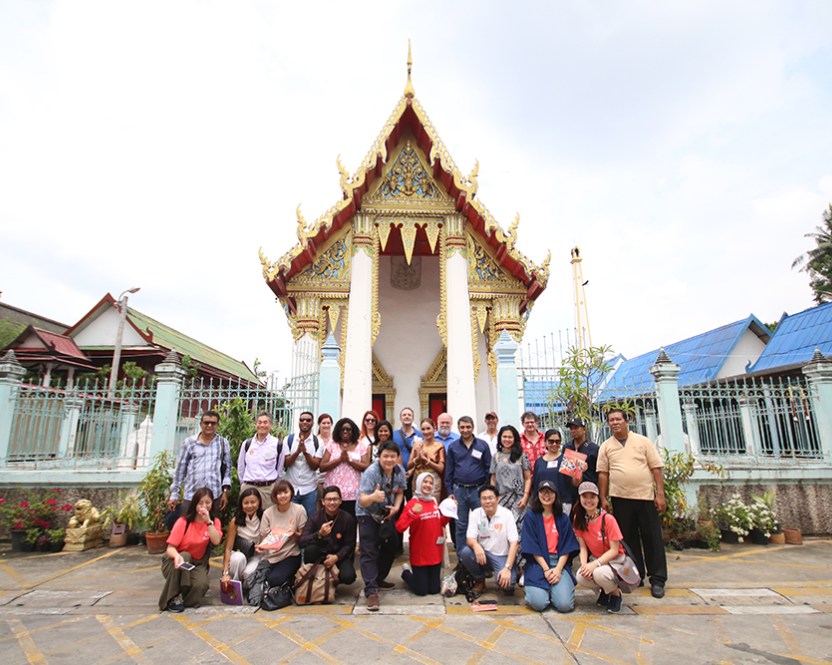
UNWTO Forum delegates savour Bangkok’s grassroots gastronomy
Bangkok, 31 May, 2018 – The second day of the 4th UNWTO World Forum on Gastronomy Tourism saw delegates fanning out across many parts of the Thai capital to enjoy the boundless diversity of its multi-cultural grassroots gastronomy.
In a carefully planned series of Bangkok Food Tours, the delegates enjoyed personal encounters with the city’s emerging generation of young Thai entrepreneurs, family-owned foodshops and third-generation immigrants from China and India – all united in providing visitors to Thailand an unmatched culinary experience.
All the tours were focussed on small and medium sized enterprises in many different parts of Bangkok, buried in the back streets of the Old City, in market-places or right on the corners of what is known as the city’s Wall Street. They included bakeries, dessert shops, noodle vendors and Thai culinary specialists.
All tours have been designed by a number of start-up entrepreneurs who are passionate about preserving not just Bangkok’s gastronomic culture but the entire environment in which they operate.
Mr. Yuthasak Supasorn, Governor of the Tourism Authority of Thailand (TAT), said: “We thought it would be good idea for delegates to enjoy half a day getting away from the conference presentations and actually experiencing Bangkok’s gastronomic diversity. We are glad that the feedback was very positive and hope that delegates will spread the word to their families, friends and colleagues.”
One itinerary led by Bangkok Food Tours (BFT) allowed participants to experience the first Historic Bangrak Food and Cultural Walking Tour, awarded Thailand’s best cultural tour programme. It deploys technology and service design process to help the local community by featuring local dishes.
Another itinerary led by HiveSters, took participants to Nang Loeng, where family-owned food-shops are bringing back the disappearing community and culture. Participants enjoyed the century-old market and taste traditional food.
A third itinerary by Local Alike focussed just on nine Thai auspicious desserts, each with different meanings and ways of cooking by SME eateries in the old town, all surrounded by ancient temples of over 100 years old. Delegates then visited the Princess Mother Memorial Park, dedicated to the grandmother of His Majesty King Mahavajiralongkorn who was also a great lover of Thai desserts.
The fourth itinerary designed by Trawell Workshop, featured multiple stops included in a Food x Technology City Pass covering a number of local communities, hostels and coffee shops in the vicinity of the city’s Giant Swing landmark.
Delegates also visited local markets and heard personal stories from the family-owned eateries, giving the entire experience a personal human touch. They later participated in a debriefing session to exchange views and share comments on what they saw and learned.
The tours will continue on the third and last day of the forum on June 1

WTTC and IATA Agree to Partner for Seamless Passenger and Better Traveller Experience
The World Travel & Tourism Council (WTTC) and the International Air Transport Association (IATA) have agreed to partner to achieve the benefits of biometrics and deliver traveller digital identity management throughout the Travel & Tourism sector for a seamless passenger experience.
The agreement, which was announced on the sidelines of the IATA AGM in Sydney, Australia, today, will mean that the two organisations will adopt a common approach, exchange information and work together to energise the entire sector to achieve international harmonisation through the use of biometrics standards and interoperability.
IATA, on behalf of its member airlines, is promoting a range of innovations to be considered for airports of the future, including the One iD initiative – IATA’s vision of an “end-to-end passenger experience that is seamless, efficient and secure” which aims at offering passengers a frictionless airport process allowing the possibility to walk through the airport without breaking stride.
Likewise, WTTC, through its Seamless Traveller Journey programme, is committed to working with the existing initiatives in this area to encourage the use of biometric technology and digital identity throughout the wider Travel & Tourism sector so travellers can enjoy a seamless, secure and efficient end-to-end journey.
Gloria Guevara, President & CEO, World Travel & Tourism Council, said: “Biometric technology is essential for the future of travel. It can help us make travel more seamless, more efficient and more secure. It improves the existing processes, reduces time for the traveller and will allow the sector to grow. WTTC and IATA are committed to maximize the potential of Travel & Tourism to create jobs and drive economic growth. By working together we can enhance security and improve the whole passenger journey.”
IATA is forecasting a rise from 4 billion annual air passengers now to 7.8 billion over the next twenty years, and UNWTO estimates global international arrivals to rise from 1.3 to 1.8 billion by 2030.
“The traveler experience has to improve if we want to achieve the growth potential. Last year one of every five jobs created in the world were in our sector, if we don’t use biometrics technology to improve the processes, we are not going to be able to achieve the potential of Travel & Tourism. Millions of jobs are at stake, so this is a priority for WTTC and our members. “
IATA Director General and CEO Alexandre de Juniac said: “The journey thorough the airport is often a frustrating experience. Passengers have to verify their identity at numerous points across their journey. IATA One iD project is helping the industry rapidly move towards the day when a face, iris or fingerprint will act as a single biometric travel token. Partnerships are key to help realise this vision and today’s agreement with WTTC will act as a strong catalyst for industry change.”
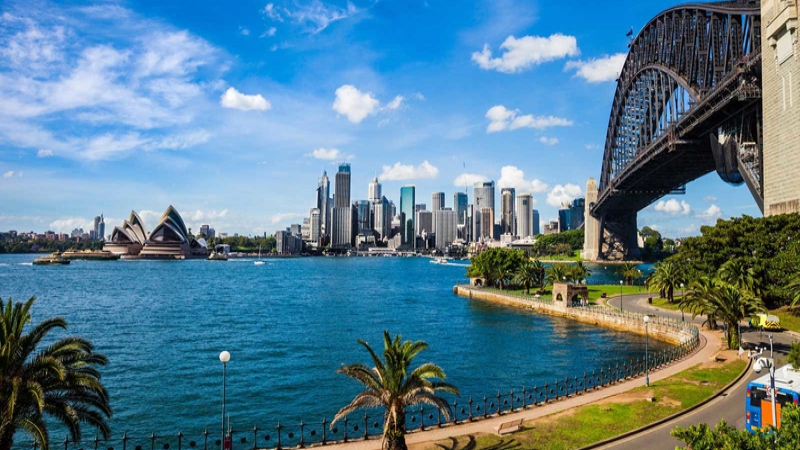
WTTC recognises Australia’s leadership on biometric travel facilitation
Australia continues to provide global leadership for travel facilitation measures with the trials of biometric passenger identification technology at major airports, says the World Travel & Tourism Council (WTTC).
During the International Air Transport Association (IATA) Annual General Meeting in Sydney, the world’s largest gathering of airline leaders, Gloria Guevara, President & CEO, WTTC, said:
“Travel & Tourism generates 10.4% of the world’s GDP, contributes with 313 million jobs, and helps build better societies. This is particularly the case in Australia, one of the largest and most advance economies of the world. For many years, Australia has been at the forefront of its use of technology to promote Travel & Tourism, from e-visas to early adoption of processing. This trend continues with innovative trials of biometric technology in major Australian airports across the country.”
2017 was a record year for Travel & Tourism in Australia with the sector contributing AUD197.5 billion to the economy and supporting 1.5 million jobs in 2017 (12.2% of total Australian employment).
“Last year, Australia welcomed 8.8 million international arrivals, a 7% increase from 2016. The potential for Travel & Tourism for Australia is very positive so we celebrate the support from the government and excellent public-private collaboration to continue creating more jobs,” Guevara said.
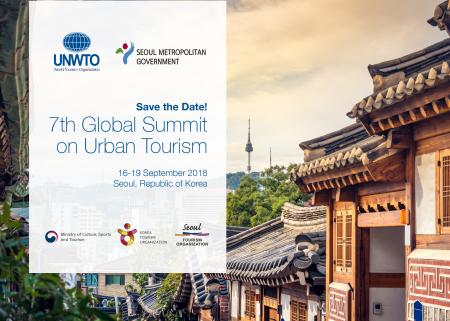
7th Global Summit on Urban Tourism
The World Tourism Organization (UNWTO) is pleased to inform that the 7th Global Summit on Urban Tourism will take place from 16-19 September 2018 in Seoul, at the kind invitation of the Ministry of Culture, Sports and Tourism of the Republic of Korea and the Seoul Metropolitan Government.
The provisional programme, general information note and registration online will be available shortly.

Tourism Ministers of the Middle East Focus on Employment at UNWTO’s Annual Gathering in the Region
Madrid, Spain, 10 May 2018 – The 44th meeting of the UNWTO Regional Commission for the Middle East, organized by the World Tourism Organization (UNWTO) and the Ministry of Tourism of the Arab Republic of Egypt (Sharm el Sheikh, 8-9 May 2018), focused on innovation and digital transformation. It was followed by this year’s UNWTO Regional Conference, which highlighted the importance of tourism’s labour market performance under the theme “Human Capital Development in Tourism: New Perspectives”.
Around 6 million jobs in the Middle East are related to tourism and the sector is expected to grow strongly in the coming years. Tourism is therefore ideally positioned as a general job provider, but especially as an entry point into the labour market for youth, and a source of economic empowerment of women through employment.
The “Human Capital Development in Tourism” conference underscored how the direct economic impact of the sector goes beyond tourism, since improving job quality and opportunities in the sector also contributes to the general economic foundations and to build up resilience. Numerous politicians, government officials and tourism experts from across the Middle East gathered for the meeting and looked closely at the need for a comprehensive and regular monitoring mechanism of tourism labour market performance in the region.
In closing the conference, UNWTO Secretary-General Zurab Pololikashvili stressed the enormous opportunities for the creation of decent jobs and enterprises through tourism in the Middle East and North Africa. In line with UNWTO’s new innovation and digital transformation agenda, he said that “tourism human capital development needs to prepare the workforce through education and training and by embracing technology and digital solutions as educational and training tools”.
Efficient partnerships between the public and private sectors are a cornerstone of such an agenda, especially considering that tourism human capital development is crucial for the competitiveness and sustainability of the tourism industry – tourism skills and competitiveness go together.
The Minister of Tourism of Egypt, Dr. Rania el Mashat, highlighted Egypt’s human capital development initiatives such as large-scale workforce development projects, capacity building initiatives, as well as apprenticeship programmes, all involving remote rural communities. “The Ministry is committed to the strengthening of tourism education and training programmes in Egypt in partnership with UNWTO”, she said.
The Ministers agreed to return to Egypt during the second quarter of 2019 for the coming 45th Meeting of the UNWTO Regional Commission for the Middle East.

Rome traffic management plans will hurt local business, ETOA survey shows
Tuesday, 8th May 2018
This week the city assembly of Rome (Assemblea Capitolina) are meeting to review a number of regulatory proposals, including those affecting coach access for the city. If approved, implementation is expected in early 2019. Click here for more information.
A recent survey carried out by ETOA indicates that the economic effect on local business will be significant if the new proposals are implemented unchanged. Nearly 70% of operators reported that the new regulation would reduce the number of overnights in Rome they include in their programmes. Nearly 85% reported that the location of their remaining bookings will be affected, with up to 55% of the volume being moved from the new restricted area (Zona C, corresponding to current Centro Storico ZTL). Over 55% of operators reported that there would be a negative impact on restaurant bookings.
Tim Fairhurst, ETOA’s Director of Policy commented: “In terms of strategic capacity management, visitors are not displacing locals in hotels. Limiting access to hotels for groups will make a negligible difference to Rome’s traffic, and overnight visitors account for more spend more than day visitors. If the visitor economy is to remain a significant part of Rome’s strategic plan, the city needs more constructive dialogue between operators, local businesses and policy makers to evolve solutions that suit long-term needs.”
Once introduced, full-size coaches will be fully restricted from the historical centre (designated Zona C). The number of short-stay drop-off / pick-up locations will be increased and the permitted duration of their use increased for some from two to three hours; all of these locations will be outside Zone C. You will find here more information.
Day passes will be available for Zones A and B for vehicles that require access to the city occasionally, e.g. on multi-country itineraries. Access to the Vatican area and around the Colosseum will have a daily cap and will require advance booking; proof of invitation to the Vatican will enable access free of charge, but will not allow stopping to pick up or set down along the way. Some exceptions to access the historical centre will be granted for coaches carrying: school students, people with disabilities and passengers heading towards (or coming from) hotel with 40 or more rooms. However, there will be a daily limit of 30 coaches. Formal documentation available here.
The immense practical difficulties in implementing such a scheme are evident. It is extremely hard to imagine how a daily limit of 30 coaches will do anything other than cause operators to avoid making bookings with suppliers located inside Zone C. The challenge is to manage the city’s infrastructure so that it remains viable for businesses, residents and visitors. Given the lack of sufficient public transport alternatives to private coaches, the new restrictions will be counter-productive.
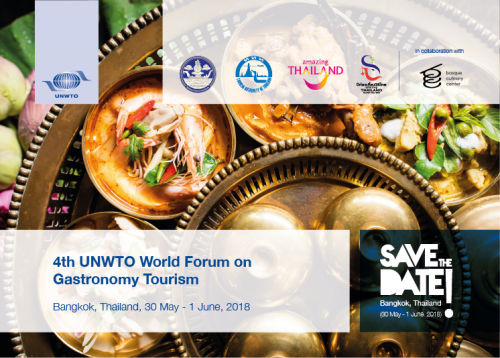
UNWTO announces 4th World Forum on Gastronomy Tourism
Following the success of the previous editions, the Government of Thailand and the World Tourism Organization (UNWTO), in collaboration with the Basque Culinary Center, are organizing the 4th UNWTO World Forum on Gastronomy Tourism, to take place from 30 May to 1 June 2018 in Bangkok, Thailand.
This 4th edition of the World Forum on Gastronomy Tourism will specifically focus on harnessing the power of technology as a driver for sustainable growth. It will provide an excellent opportunity for leading experts in gastronomy tourism to discuss currents trends and challenges in the sector, exchange best practices and inspire discussion on intercultural dialogue, gastro diplomacy, and the importance of technology for sustainable gastronomy tourism.
Like previous editions of the UNWTO World Forum on Gastronomy Tourism, this forum will explore gastronomy as the essence of culture and an element of intangible heritage and the interrelation between gastronomy and tourism that can enhance sustainable local development.
